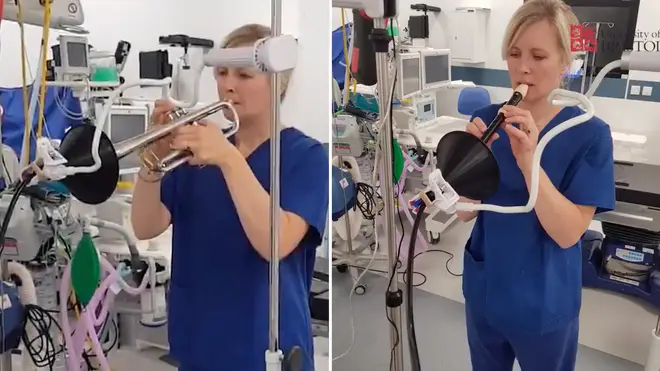Covid study with trumpeter Alison Balsom reveals brass-playing is safer than talking
30 June 2021, 15:16

Top trumpet virtuoso Alison Balsom joins a team of researchers and musicians, with findings that could mean full orchestral music getting back to stages sooner.
A new COVID-19 study from the University of Bristol has found aerosols generated by playing woodwind and brass instruments are less than those produced when speaking and singing.
The study was carried out in a controlled environment with no background aerosol particles to interfere with the measurements. It encompassed nine musicians playing 13 woodwind and brass instruments.
Researchers from the university found large droplets (>20 μm diameter) were not dispersed during instrument playing but were observed during singing and coughing.
Together, this led to the findings that playing woodwind and brass instruments generates fewer aerosols than simply talking at a high volume.
Read more: Study finds singing no riskier than talking for spreading COVID-19

Bristol University research finds playing woodwind and brass instruments generates less aerosol than vocalisation
As part of their research, the university enlisted top performing musicians, including star trumpeter Alison Balsom. She performed in the laboratory conditions to help deliver the all-important droplet data.
Renowned for her interpretations of the Haydn and Hummel trumpet concertos and other virtuosic repertoire, Balsom performs a much more widely known piece of music in the footage: ‘Happy Birthday’.
Jonathan Reid, Director of Bristol Aerosol Research Centre and Professor of Physical Chemistry in the School of Chemistry at the University of Bristol, said: “This study confirms that the risks of transmission of SARS-CoV-2 are likely elevated during vocalisation at loud volume in poorly ventilated spaces.
“By comparison, playing wind instruments, like breathing, generates less particles that could carry the virus than speaking or singing.”

Introducing the Baroque Trumpet with Alison Balsom | Classic FM
Dr Bryan Bzdek, Lecturer in the School of Chemistry at the university, said the study may have important policy implications in a roadmap to lifting COVID-19 restrictions, during a time when many performing arts, orchestral and musical performances have been severely restricted.
The research was carried out by a collaborative team from Imperial College London, University of Bristol, Wexham Park Hospital, Lewisham and Greenwich NHS Trust and Royal Brompton Hospital.


























